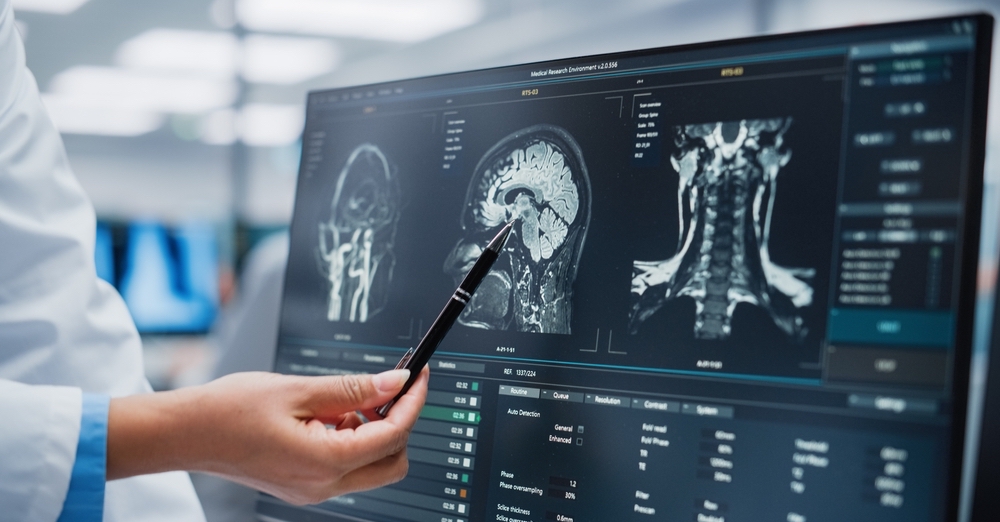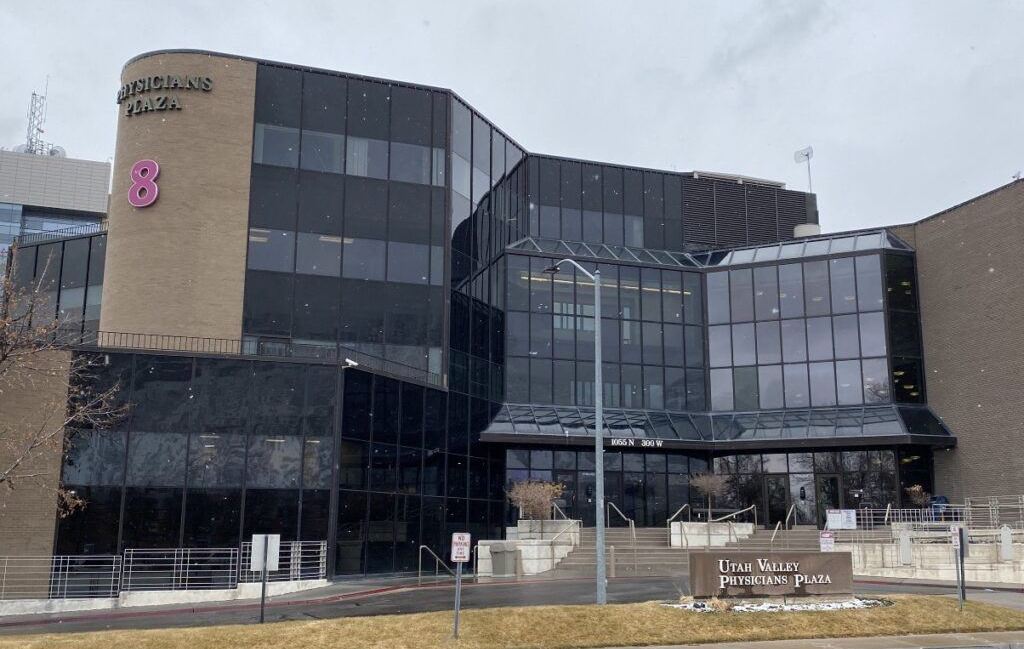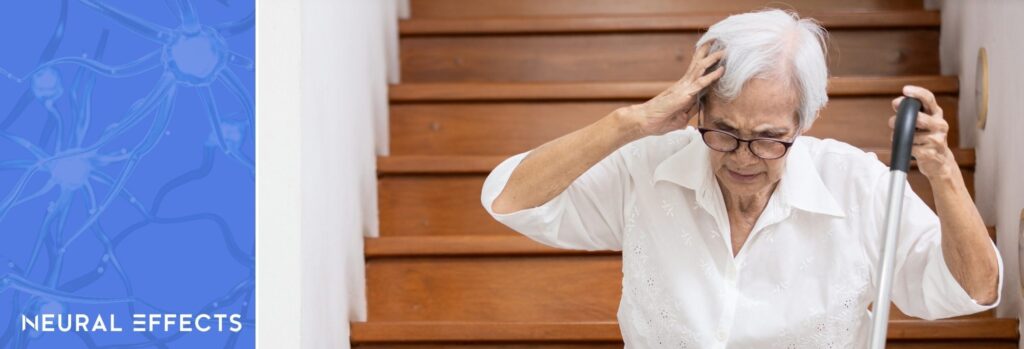Memory problems and difficulty thinking are probably the most common symptoms associated with Alzheimer’s disease and other types of dementia. However, patients can also experience a range of physical symptoms, such as dizziness, vertigo, fainting, and lightheadedness.
These symptoms can be extremely alarming for a dementia patient because of the increased risk of falls and injuries, especially if the patient lives alone.
Dizziness can be caused by a variety of factors, including vestibular problems, side effects from medication, changes in blood pressure, and even dehydration — all common conditions in elderly persons with dementia. If doctors know what is causing the dizzy spells, they can treat accordingly.
At Neural Effects, we offer the EMPOWER program with an aim to slow down cognitive and physical decline. We look at our patients’ symptoms holistically. This makes our dementia clinic an appropriate place of treatment not just for dizziness or exclusively for cognitive decline, but for most symptoms of dementia. And for dementia-related conditions we don’t treat, we coordinate closely with local healthcare providers we know and trust.
In this article, we’ll discuss:
- The ways dementia patients can experience dizziness
- What causes dizziness in dementia patients
- How dizziness in dementia patients is treated
- How we approach dementia treatment at Neural Effects
- How to manage dizziness at home
Neural Effects uses the latest evidence-based techniques to diagnose and help dementia patients. We are located in Provo, Utah and serve anyone in Salt Lake County or the Utah County area. We are in network for most types of medical insurance. Schedule your evaluation today.
How Does Dizziness Manifest in Dementia Patients?

Feeling dizzy is one of the first signs of dementia for some patients. Even in the early stages of the disease, most dementia patients experience dizziness and balance problems at some point. In addition to dizziness, dementia patients may also experience a range of related symptoms, including:
- Lightheadedness
- Unsteady walking
- Sensation of spinning
- Vertigo
- Loss of balance
- Feeling weak and confused
- Fainting or near-fainting episodes
- Nausea
- Vomiting
Dizziness when getting up from a sitting or lying down position is usually caused by a sudden drop in blood pressure. This happens because blood accumulates in the legs, leaving the brain temporarily with an insufficient supply.
Dizziness increases the risk of falls and injuries. It also makes it more difficult to carry out normal activities. This symptom can be a sign of a variety of medical conditions that can get worse if left untreated. For this reason, always seek medical care if you start to feel dizzy and lightheaded.
Causes of Dementia Dizziness

Dementia patients can feel lightheaded and dizzy for a variety of reasons. Sometimes these symptoms are temporary or they come and go. The most common causes of dizziness in dementia patients include:
- Vestibular problems
- Dementia’s direct effect on the brain
- Autonomic Nervous System (ANS) dysfunction
- Medication side effects
- Other health conditions and causes, including:
- Low blood sugar
- Anemia
- Migraines
- Dehydration
- Cardiovascular problems
- Depression and anxiety
Vestibular Problems
The vestibular system — located in the inner ear — controls balance and helps the brain understand where the body is in space. Problems with this system cause gait instability, poor spatial memory and spatial navigation skills, and difficulties in stabilizing gaze while moving, all of which can trigger episodes of dizziness and lightheadedness in dementia patients.
Vestibular problems are often very responsive to therapy, as discussed in the section on treatment below.
Dementia’s Effect on the Brain
In a healthy brain, an area called the cerebellum controls body movements and processes information coming from the sensory receptors of the body, such as vision, vestibular, and body motion (called proprioception).
However, in dementia patients, this area may not function properly. As a result, incoming information overwhelms the cerebellum and triggers symptoms of vertigo and dizziness. This effect is common in patients with vascular dementia (which affects blood flow in the brain) and in patients with a rare form of Alzheimer’s disease called posterior cortical atrophy (which directly disrupts the cerebellum).
Further reading: What can make dementia worse
Autonomic Nervous System (ANS) Dysfunction
Patients with some types of dementia, namely Alzheimer’s disease and Lewy body dementia, can experience autonomic dysfunction, in which normal function of the autonomic nervous system (ANS) is disrupted.
The autonomic nervous system (ANS) regulates a variety of essential bodily functions, including breathing rates, heart rate, and blood pressure. Most internal organs are regulated to some degree by the autonomic nervous system (ANS). As a result of ANS dysfunction, patients may experience sudden low blood pressure which can lead to dizzy spells and fainting.
Medication Side Effects

One of the most common causes of dizziness and fainting in patients with dementia are the side effects of medicines they’re taking.
Memory-related medications such as memantine (Namenda), rivastigmine (Exelon), donepezil (Aricept), and galantamine (Razadyne) can help patients function better and slow down cognitive decline. However, dementia medications can slow down the heart rate to the point that patients feel dizzy and even faint. For example, a study showed that over two-thirds of patients using cholinesterase inhibitors have a slower heart rate and experience dizzy spells.
In addition, drugs prescribed to treat other dementia symptoms, such as anxiety, insomnia, and depression can all cause dizzy spells. Common drugs known to cause dizziness include, for example, antidepressants, antiseizure drugs, antipsychotics, blood pressure-lowering drugs, muscle relaxants, and sleeping pills.
Other Causes of Dizziness
- Low Blood Sugar: Patients in the later stages of dementia may struggle to recognize and react to symptoms associated with low blood sugar. This increases the risk of severe low blood sugar (known as hypoglycemia), which in turn can cause dizziness, confusion, mood changes, hospitalization, and even death in extreme cases.
- Anemia: Dementia patients are prone to developing anemia, which means red blood cells are not transporting enough oxygen around the body. When there’s a lack of oxygen, some parts of the brain can become hypoxic, leaving patients weak and dizzy.
- Migraines: Dementia patients often complain of migraines and headaches. During a migraine, the brain is more sensitive to outside stimuli like noise and light, and patients can also feel dizziness or vertigo. These symptoms can last for a few minutes to a few hours.
- Dehydration: The risk of dehydration is particularly high in patients with dementia. They might forget to drink and/or fail to recognize that they are thirsty. In cases of severe dehydration, patients develop hypotension and feel dizzy because the brain is not receiving enough oxygen.
- Cardiovascular problems: Dizziness can be a sign of cardiovascular disease, which is common in dementia patients. Heart conditions that cause dizziness include irregular heartbeat, heart palpitations, and shortness of breath. In most cases, dizziness associated with heart problems is accompanied by other symptoms, including swollen extremities, frequent fatigue, or chest pain.
- Anxiety and depression: It’s common for dementia patients to develop anxiety, depression, and other mental health problems. In addition to feeling tired and irritable and struggling to concentrate, these patients may also experience a range of physical symptoms including dizziness. If related to anxiety and depression, dizzy spells are more likely to occur in stressful situations, and patients may also experience increased heart rate and difficulty concentrating.
Neural Effects’ therapists are trained to help dementia patients overcome dizziness. We are located in Provo, Utah and serve anyone in Salt Lake County or the Utah County area. We are in network for most types of medical insurance. Schedule your evaluation today.
Treating Dizziness in Dementia Patients
As dizziness can be caused by different factors, the best treatment for each patient depends on the underlying cause. The most suitable treatment option would not be the same for patients whose dizziness is caused by vestibular problems as for those experiencing dizziness due to medication side effects, for example.
Vestibular Therapy
Vestibular therapy includes exercises to address dizziness and can benefit patients with inner ear or balance problems. We offer vestibular therapy at Neural Effects. Typically, this training involves:
- Gaze stabilization exercises to help patients maintain their vision while it’s fixed on a certain point, while doing various movements.
- Habituation exercises to help the brain learn how to cope with certain movements without causing dizziness.
- Balance training to improve core strength and posture.
Adjusting Medication
If dizziness is likely from a side effect of medication, changing doses or times when patients take their meds may help relieve symptoms. Check with your dementia doctor before changing your medication.
Treating Specific Symptoms Associated with Dizziness
In some patients, dizziness is triggered by nausea, migraines, or feeling anxious. Medication to treat these symptoms might help relieve symptoms. For example:
- Antihistamines can be used to treat dizziness and nausea associated with vertigo.
- Benzodiazepines can be used to treat vertigo and anxiety.
- Anticholinergics can be used to treat motion sickness and vertigo.
- Dopamine antagonists can be used to treat nausea and vomiting.
Psychotherapy and Cognitive Behavioral Therapy
These therapies can help dementia patients whose dizziness is caused by anxiety disorders. For example, cognitive behavioral therapy (CBT) identifies negative thought patterns and replaces them with positive ones. Over time, this improves mood and reduces dizziness. Patients with dizziness caused by physical disorders, such as vestibular problems, may also respond well to CBT, but treatment needs to include vestibular therapy.
Fluid and Electrolyte Replacement for Dehydration
Severe cases of dehydration can be treated with an IV to replace some of the lost fluid. This is a quick treatment and typically, in a day or two, the patient is able to regain the ability to take in nutrients and fluids normally.
Treatment at Neural Effects

The treatments described above only address dizziness or conditions that may trigger this symptom. However, the reality is that dementia causes a variety of cognitive, physical, and emotional symptoms.
If you’re looking for a more holistic treatment for dementia, we offer a program called EMPOWER which combines cognitive stimulation therapy (CST) and aerobic exercise to boost the effect of therapy and help delay the progression of symptoms.
Before treatment, all patients undergo a dementia evaluation. You’ll take a neurophysical exam (also known as neurocognitive evaluation) to find out exactly how dementia has affected your cognitive skills. Our therapists also assess physical abilities, such as balance and posture, as well as emotional problems, including signs of depression, anxiety, and stress.
If you are experiencing severe vertigo, we might refer you to an ear, nose and throat specialist (ENT). If we believe you would benefit from other specialists’ attention, we will refer you appropriately.
This assessment typically lasts 2-2.5 hours. Patients who already have a dementia diagnosis must still complete this exam because it provides useful information to guide treatment decisions. For patients who don’t have a diagnosis yet, we coordinate with their neurologist or other treating physician to investigate whether it is dementia, and if so, what type.
All information gathered is used to create a cognitive care plan (CCP). Everyone we assess gets a personalized CCP. The CCP contains important recommendations that can help protect your cognitive health regardless of whether you pursue treatment at Neural Effects.
The CCP includes the following health information:
- Diagnosis
- Results from the assessment
- Risk factors and how the disease is likely to progress
- Lifestyle changes that may help the patient
- How the family can get involved
- Recommended treatment options
After the initial assessment, patients can start their therapy sessions. Our program includes two sessions per week for seven weeks, for a total of 14 one-hour sessions.
Therapy starts with a 10-15 minute session of aerobic exercise, usually done on a stationary bike. For patients experiencing dizziness, these sessions can include some of the exercises typically used in vestibular therapy, including balance and coordination and gaze stabilization exercises. Our therapists can change and adapt the exercises in terms of intensity and duration to ensure patients are safe at all times. This is particularly important for patients who may experience dizzy spells while exercising.
Cardiovascular exercise is a crucial part of treatment. Physical exercise stimulates blood flow to the brain and triggers a phenomenon called the post-exercise cognitive boost (PECB). In turn, PECB involves the release of a chemical called brain-derived neurotrophic factor (BDNF), which makes the brain more receptive to cognitive stimulation therapy.
The second part of each therapy session involves cognitive stimulation therapy. CST involves various activities to stimulate thinking and memory, including discussion of past and present events, word games, puzzles, music, and practical activities. Two trained facilitators work with a small group of patients. (At our clinic, groups are capped at six patients.) These facilitators help discussions stay on track and help patients socialize with each other during the sessions.
In addition, family members and caretakers can attend the first session to learn more about CST. This means they can then help patients at home by repeating some of the activities and games. Our staff also educate loved ones about lifestyle changes that can help dementia patients, including engaging in regular exercise, eating a healthy diet, and maintaining social contact with friends. Finally, families of dementia patients receive follow-up resources, including suggestions of support groups both for the patients and their caregivers.
Schedule your evaluation at Neural Effects today.
Ways to Manage Dizziness at Home

Dizziness can be dangerous for patients with dementia, especially for those who live alone. Here are a few suggestions for coping at home:
- Even if the dizzy spells are not severe, always seek medical care if you have not discussed the condition yet with your doctor.
- Keep in contact with friends and family members on a regular basis to let them know how you’re feeling.
- Carry a personal alarm with you at all times. Wearable options include lanyards, wrist devices, and belt clips.
- Some come with the option to include automatic fall detection. If you feel a dizzy spell coming, activate the alarm and call for help.
- If dizzy spells are frequent or severe, use a cane or a walker. It’s important to consult a doctor or physical therapist before purchasing a cane or walker though. There are many different types available, and the patient’s gait, balancing ability, and grip strength must be taken into account when deciding which one to choose.
- Remove trip hazards from your home, such as rugs or loose electrical cables on the floor.
- If you can, sit or lie down when you start to feel dizzy. A dark room may help if you’re experiencing vertigo.
- Avoid caffeinated drinks and alcohol, as excessive use can worsen symptoms.
- Drink plenty of fluids to avoid dehydration.
- Check your blood pressure regularly and contact your doctor if it’s too low.
- Try mindfulness exercises or yoga to relax.
- Follow a healthy sleep pattern.
- Safely engage in regular physical activity.
Click here to read more about natural treatments for dementia — this includes supplements, physical therapy and other therapies, along with lifestyle changes to improve quality of life, combat cognitive impairment and memory loss, and increase participation in daily activities.
Neural Effects uses the latest evidence-based techniques to diagnose and help dementia patients. We are located in Provo, Utah and serve anyone in Salt Lake County or the Utah County area. We are in network for most types of medical insurance. Schedule your evaluation today.
